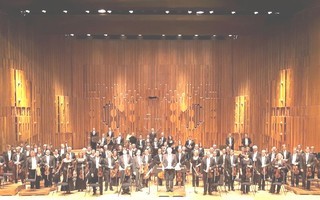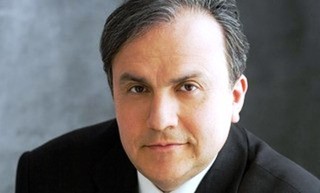|
Back
A Totally Divine Comedy New York
David Geffen Hall
10/25/2015 -
Béla Bartók: Dance Suite, sz. 77 – Piano Concerto No. 2, sz. 95 – Concerto for Orchestra, sz. 116
Yefim Bronfman (Pianist)
London Symphony Orchestra, Valery Gergiev (Conductor)

V. Gergiev, LSO (© Alberto Venzago)
Why this all-Bartók program is officially part of the “White Light” festival is beyond my ken. Valery Gergiev and the London Symphony Orchestra produced all the orchestral colors in their palettes except white, so synesthisiacs in the audience would have spotted the fiery yellow of the LSO brass, trimmings of scarlet and crimson for the “game of twos” in the Concerto, with green and red Suite dances and tumultuous black thunder and orange lightning in Yefim Bronfman’s Second Piano Concerto.
White, though, is the lack of color. Both Bartók and Gergiev painted David Geffen Hall with all the colors needed–except pastels and gentle hues.
And while several in the audience had come to hear Yefim Bronfman play Bartók, disappearing during the intermission, I confess that the most dazzling painting I have ever heard came from Gergiev doing the Concerto For Orchestra.
The conductor is not known for his “light hand” in conducting. When anything is roarable (like the Piano Concerto), he doubles the roaring, pounds out the emotions and turns sparks into fire. But the Concerto for Orchestra is simply one of the Gargantuan comedies of the 20th Century. And Mr. Gergiev played this stunning music to bring out all the sparkle, the wit–not sardonic wit, but pure non-sarcastic joviality in the music.
True, that mysterious opening was more solemn than mysterious, but the LSO cellos and basses gave strong indications of what was to come. Once he came to that Allegro, he let the LSO go on its own with great contrapuntal force. This was robust music, rich individual music with the glorious strings of that orchestra plunging ahead in a mighty movement that could stand on its own.
Gergiev didn’t allow even a second between movements. That Giuoco delle coppie, the infamous Game of Pairs, is, yes, a jokey movement, a scherzando, but oh how carefully he prepared those duets of bassoons and oboes and clarinets and flutes. Mr. Gergiev let the musicians tiptoe through their paces, he let the sidedrum punctuate, and then he filled it out with a quiet chorale, as if blessing the “game”.
No comedy is complete without a tragic subtext, but the Elegia was less sad than simply mysterious, a shadow of sorrow before the boisterous fourth movement, and a finale which was both fast and transparent. Those marvelous LSO brass, the percussion and–above all–the timpani pounding out all the different emotions of the work.
Some may say that the Concerto was one of the simpler works, created by a man on the verge of despair and death in America. But the Gergiev notion was from the pure joy of an artist...or in this case two artists playing their own “game of twos”.
One didn’t need an encore, but Gergiev conducted a pseudo-Magyar piece, Brahms’s First Hungarian Dance, without subtlety, but with the most glorious sounds from the orchestra.

Y. Bronfman (© Dario Acosta)
Onto the Second Piano Concerto. Previously I had enjoyed Yefim Bronfman as man who conserves his considerable strength. No such caveats here: from the beginning, he and his long-time collaborator, conductor Gergiev, gave a weighty, thunderous sound to the opening, with again that transparency with all the underlying lines. Yet it wasn’t the undercurrent, but the sheer tumultuousness which brought this alarmingly alive. The Adagio was stolid enough, but with that superhuman technique put into force, that was almost a pre-thought to the rambunctious finale.
And what did Mr. Bronfman do for an encore? The supposed opposite of Bartók, a truncated (no repeats) Scarlatti sonata played with all the sensitivity required. (On the other hand, Bartók did arrange Scarlatti, though I think this performance was the unedited original.)
The afternoon began with very early Bartók, the Dance Suite, the composer’s homage to four or five different ethnic areas–from Wallachian to Turkish–which made up his own country. Gergiev, it goes without saying, put the LSO through its paces, which were the paces of a prized steed ready to run a tough musical marathon.
Harry Rolnick
|